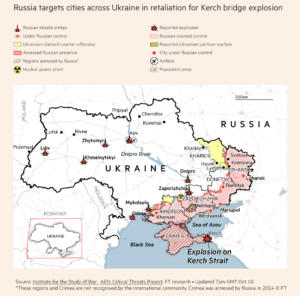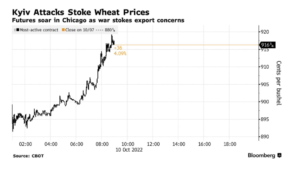As a result of the attack on Iran, nitrogen fertilizer at the port of New Orleans has seen an increase in price this week. Urea prices for barges in New…
After Bridge Attack, Russia Launches Missiles into Ukraine- Wheat Climbs, While Mississippi Logjam Eases
Financial Times writers Roman Olearchyk, Mehul Srivastava, Max Seddon, and Christopher Miller reported today that, “Vladimir Putin has described Russia’s massive airstrikes on Ukraine, its most extensive since the early weeks of his seven-month invasion, as retaliation for the bombing of the bridge linking Russia to the Ukrainian peninsula of Crimea.
“Speaking at a meeting of his security council on Monday, the Russian president accused Kyiv of a ‘terrorist attack’ at the Kerch bridge, damaged by an explosion on Saturday, and said ‘leaving such a crime without a response is just impossible.'”

“The airstrikes mark further escalation after blaming Ukraine’s ‘secret services’ for conducting the Kerch bridge attack. He spoke shortly after several missiles hit downtown Kyiv in the first attack on Ukraine’s capital since late June. Residents fled to bomb shelters as smoke rose over the city.”
The FT writers noted that, “Missiles also struck Lviv, in western Ukraine; Dnipro, in the centre of the country; and several other cities, including Zaporizhzhia and Mykolayiv in the south, which are close to the frontline.
“There were reports of explosions in the Black Sea port of Odesa, and air raid alerts went off in every part of Ukraine, other than occupied Crimea.”
Also today, Bloomberg writer Megan Durisin reported that, “Wheat futures soared more than 4% as the Ukrainian capital suffered its first strike in months, stoking concerns that the escalating war poses a fresh threat to Black Sea grain exports.

“Explosions rocked Kyiv early on Monday, two days after an attack on a key bridge that links Russia to Crimea. President Vladimir Putin blamed that blast on Ukraine.
The intensifying conflict calls into question whether the two sides will agree to extend the Ukraine grain-export deal that’s due to expire in about a month.
The Bloomberg article added that, “‘The beginning of the week could be very nervous with the risk of increased tensions in the Black Sea basin,’ Paris-based adviser Agritel said in a note.”
And Reuters writer Naveen Thukral reported today that, “Chicago wheat futures jumped more than 1% on Monday, underpinned by concerns over the Russia-Ukraine war slowing grain shipments from the Black Sea region.”
The Reuters article added that, “‘Ukraine’s exports continue to be a focus for market chatter,’ said Tobin Gorey, director of agricultural strategy at the Commonwealth Bank of Australia. ‘Whether the current export corridor will remain open beyond late November is still a focus issue.'”
Last week, prior to Saturday’s attack on the bridge over the Kerch Strait, Reuters writer Michelle Nichols reported that, “U.N. Secretary-General Antonio Guterres and his team are working to expand and extend for a year a U.N.-brokered deal allowing Ukrainian Black Sea grain exports, which could expire in late November.
“‘We’re trying to remove the uncertainty to ensure that people are publicly saying that ‘yes, this will be extended a further year,’ but we’re not there yet,’ said U.N. spokesman Stephane Dujarric, adding that U.N. officials are also working to facilitate Russian grain and fertilizer exports.”
Today, Reuters writer Emma Farge reported that, “U.N. aid chief Martin Griffiths voiced confidence on Monday that a U.N.-brokered deal allowing Ukrainian Black Sea grains exports could be extended and even expanded despite apparent revenge strikes by Russia on Kyiv on Monday.
“‘Our view at the UN is we of course should seek its renewal, and I’m reasonably confident that we will see it (renewed) but also that it needs to go beyond a four-month cycle. We need to see it renewed for a year,’ Griffiths said in a Geneva press briefing in response to a question about the impact of the latest escalation in the more-than-7-month-war.”
Also last week, Reuters writer Pavel Polityuk reported that, “A fifth vessel chartered by the United Nations World Food Programme (WFP) has left Ukraine’s Black Sea port of Chornomorsk and will deliver 30,000 tonnes of Ukrainian wheat to Ethiopia, Ukraine’s infrastructure ministry said on Friday.
“Ukraine has already shipped around 150,000 tonnes of wheat to Ethiopia, Yemen and Afghanistan under the programme.”
Meanwhile, on Friday, Matthew Wilde and Mary Kennedy reported at DTN that, “Low water levels have caused at least eight barge groundings this week, portions of the Mississippi River to be temporarily closed backing up shipping traffic, barges being loaded at far less than capacity and temporary shutdowns at grain terminals. Corn and soybean basis levels in many areas have dramatically widened as a result, hurting farm revenue potential.
“The Mississippi River sandbars caused a barge grounding at Stack Island, located in Issaquena County, Mississippi, 200 miles north of New Orleans. There were also groundings near Memphis.”
Drought has lowered river flows and hindered navigation in major U.S. river basins. More than 70% of the #MissouriRiver Basin is in #drought. September runoff was 47% of normal.
— Denise Gutzmer (@DroughtDenise) October 9, 2022
The #MississippiRiver is so low that barges run aground and drinking water quality is affected. pic.twitter.com/PbkHNa8R3N
However, Bloomberg writer Victoria Cavaliere reported yesterday that, “A backup of more than 2,000 boats and barges on the Mississippi River is being cleared as two closures along the waterway reopened on Sunday.”
Cavaliere pointed out that, “Currently, there is no line of vessels near Memphis, though there are restrictions there to one-way traffic. In Mississippi, the lines of barges and vessels north and south is down to fewer than 900, the Coast Guard said.
“On Friday, the backup along the river stood at more than 2,000 at various points. The US Army Corps of Engineers has been dredging near Stack Island to make water levels deeper.”
Bloomberg writers Joe Deaux, Michael Hirtzer, and Kim Chipman reported last week that, “Shippers struggling to move grains and fertilizer along a dried-up Mississippi River are also racing to beat the start of winter in the northern Midwest, when the river freezes and commerce shuts down.
“Archer-Daniels-Midland Co., one of the world’s biggest crop traders, said in a note to its clients this week that shipments planned for the upper Mississippi River should be completed as soon as possible to arrive in time before the river’s northern reaches begin to shut down next month.”
In more specific news regarding agricultural production, Reuters writers Gus Trompiz and Gergely Szakacs reported last week that, “The European Union’s maize harvest is in full swing and field work is confirming widespread drought damage that analysts expect to push the feed grain crop to a 15-year low.
“A historic drought and successive heatwaves in Europe affected maize, or corn, during crucial summer growth stages, and showers in the past month appeared too late.”
And The Wall Street Journal editorial board indicated in today’s paper that, “As political polarization grows, states are increasingly seeking to regulate beyond their borders. On Tuesday the Supreme Court will consider where to draw the line in a challenge (National Pork Producers Council v. Ross) to California farm-animal regulations that has far-reaching implications.”





